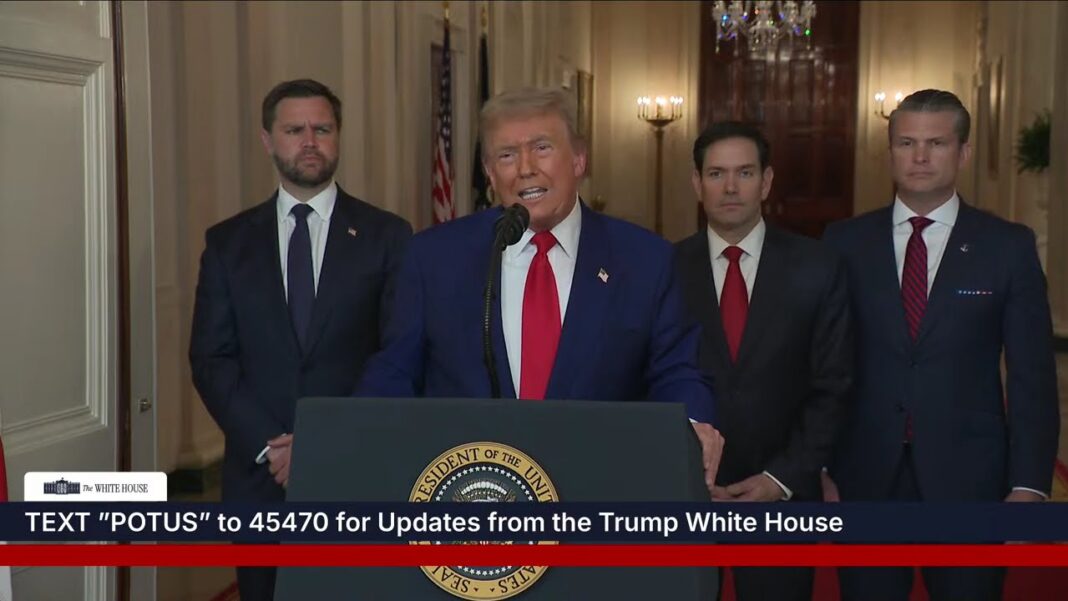President Donald Trump’s decisive airstrikes on Iran’s nuclear facilities at Fordow, Natanz, and Isfahan have been hailed as a courageous and necessary action to safeguard American interests and global stability. The strikes, executed with precision, crippled Iran’s nuclear ambitions, sent a powerful message to a regime long defiant of international norms, and bolstered U.S. leadership in a volatile region. Far from reckless, Trump’s decision is being praised by key lawmakers as a strategic masterstroke that preempted a grave threat while reinforcing America’s resolve against adversaries.
The rationale behind Trump’s action rests on Iran’s persistent pursuit of nuclear weapons, which posed an existential danger to the United States, its allies, and the world. For years, Iran has flouted international agreements, enriched uranium to dangerous levels, and supported terrorist proxies across the Middle East. Trump’s strikes targeted the heart of this threat, dismantling facilities critical to Iran’s nuclear program. Senator Lindsey Graham, a steadfast ally, lauded the president’s resolve, stating, “President Trump just took the most decisive action against Iran’s nuclear threat in decades. This sends a clear message: America will not tolerate a nuclear-armed Iran.” Graham’s praise underscores the view that the strikes were a long-overdue response to Iran’s provocations.
The timing of the strikes was also strategic, aligning with Israel’s ongoing conflict with Iran to maximize impact and deter further aggression. By acting swiftly, Trump prevented Iran from advancing its nuclear capabilities under the cover of regional chaos. Representative Jim Jordan, a vocal supporter, called the operation “a game-changer,” emphasizing that “President Trump showed the world that America is back and won’t let rogue regimes like Iran dictate terms.” Jordan’s enthusiasm reflects the sentiment among Trump’s base that the strikes restored U.S. dominance and deterred adversaries like China and Russia, who have watched Iran’s belligerence with interest.
Trump’s decision also addressed the failures of past diplomacy, particularly the 2015 Iran nuclear deal, which critics argue emboldened Tehran while doing little to curb its ambitions. By taking military action, Trump sidestepped fruitless negotiations and struck directly at Iran’s capacity to threaten global security. Senator Tom Cotton, known for his hawkish stance, praised Trump’s clarity of purpose, declaring, “The president’s bold action has set Iran’s nuclear program back years. This is what leadership looks like—decisive, uncompromising, and unafraid.” Cotton’s words highlight the belief that Trump’s strikes achieved what years of sanctions and talks could not: a tangible setback for Iran’s regime.
The strikes also reinforced America’s commitment to its allies, particularly Israel, which has long warned of Iran’s nuclear threat. By aligning with Israel’s efforts, Trump strengthened a critical partnership and signaled that the U.S. will stand firm against shared enemies. Representative Marjorie Taylor Greene celebrated this aspect, stating, “President Trump just proved he’s got Israel’s back and ours. These strikes stopped Iran’s nuclear dreams cold.” Her comments resonate with lawmakers who see the operation as a fulfillment of Trump’s promise to prioritize American and allied security.
Critics of the strikes, particularly Democrats, have raised concerns about congressional authorization and potential escalation. Yet supporters argue that the president acted within his constitutional authority to protect national security against an imminent threat. Representative Matt Gaetz dismissed such criticisms, asserting, “Trump doesn’t need a permission slip from Congress to keep America safe. He saw the threat, he acted, and the world is better for it.” Gaetz’s defiance reflects the view that decisive executive action was warranted given Iran’s history of deceit and aggression.
The strikes have also shifted the regional balance of power, weakening Iran’s ability to project influence through proxies like Hezbollah and Hamas. By targeting nuclear sites, Trump not only neutralized a direct threat but also diminished Iran’s leverage in the Middle East. Senator Ted Cruz captured this broader impact, stating, “President Trump’s strikes have crippled Iran’s ability to terrorize the region. This is a win for America, Israel, and every nation tired of Iran’s chaos.” Cruz’s remarks underscore the operation’s ripple effects, which supporters believe will deter other hostile actors.
As Iran reels from the strikes and global powers reassess their strategies, Trump’s supporters argue that his action has redefined America’s role on the world stage. Far from inviting retaliation, the strikes have forced Iran into a defensive posture, exposing its vulnerabilities.
Representative Lauren Boebert summed up this sentiment, saying, “Trump just showed Iran who’s boss. This is how you keep America strong—by hitting hard and fast.”
In a world fraught with uncertainty, Trump’s decision to strike Iran’s nuclear facilities stands as a bold assertion of American power. By neutralizing a clear and present danger, supporting key allies, and reshaping the Middle East’s strategic landscape, the president has earned the praise of lawmakers who view his action as both necessary and transformative. As the dust settles, Trump’s strikes may well be remembered as a defining moment of his presidency—one that put America first and the world on notice.








